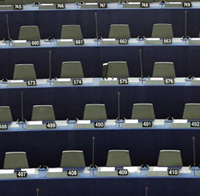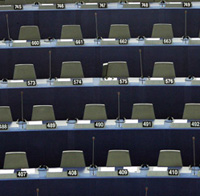How effective is your MEP?

 I’m probably about the only person anywhere who gets really hung up on the question of how effective MEPs are. A majority of the populations of European countries cannot muster the energy to turn up to vote, let alone cast a critical and analytical eye over their European representatives.
I’m probably about the only person anywhere who gets really hung up on the question of how effective MEPs are. A majority of the populations of European countries cannot muster the energy to turn up to vote, let alone cast a critical and analytical eye over their European representatives.
But anyway, for European Parliament and good governance geeks like me, there’s a new website that gives a whole goldmine of information about MEPs’ performance, run by the Romanian institute IPP.
There are three groups of facts: attendance at plenary sessions, loyalty to political groups in roll call votes, and motions for resolutions. It’s far from a comprehensive data set, but interesting nevertheless. A comparison between attendance records of British and Italian MEPs partially disproves the point raised in a comment on this blog by James Stevens – at least when it comes to plenary sessions attendance of Italian MEPs is not significantly lower than that of the British, although plenary attendance is a very crude measure. Ashley Mote fares worst as he was in jail for a large part of the last year, while Robert Kilroy Silk (second lowest) presumably spent his time on the Côte d’Azur instead.
More interesting is loyalty to political groups for the UK. Green Jean Lambert wins in terms of slavish loyalty, followed by all the Lib Dem MEPs, then the Labour MEPs (Neena Gill tops the Labour list – no surprise there), then UKIP’s MEPs, and finally the Tories. This is how you would expect the table to line up, so it’s interesting to see it statisticaly represented.
Jens Peter Bonde’s record is also fascinating. A very active MEP with a good attendance record, he nevertheless ranks as the 3rd most rebellious MEP in the EP.
@Josh – I promised to reply by e-mail on Twitter, but as there’s nothing private about what I’m going to write I thought I may as well answer in a comment here!
First of all votewatch.eu is the best there is now in terms of following the way MEPs behave. But the site is only as good as the data available to the site, and the problem is that there are three types of votes in the plenary of the EP: roll call votes (i.e. recorded who votes which way), electronic votes (MEPs press the same buttons as for rill calls, but who voted which way isn’t recorded), and simple shows of hands. VoteWatch can only make anything of the first type of votes.
I can find no data on the % of votes that are roll call votes, but there were 1351 such votes in 18 months July 09 – December 10 (page 3 here. Considering a single complex piece of legislation can need upwards of 200 votes on amendments this does not strike me as very high number… Sorry I can’t be more precise.
This then ties in with the point that I raised to you on Twitter, namely that MEPs might not actually know which way they are voting. ALL MEPs, regardless of area of interest, vote on everything, and on the vast majority of dossiers they just vote along the lines defined by the Group Coordinators, or the coordinators in their national delegations.
Take – for example – Arlene McCarthy, one of the two Labour MEPs for the North West (her page on the EP website here. Her main work is on Economic and Monetary Affairs while if you look at the votes in plenary tomorrow you have everything from blue fin tuna to EU China trade (agenda here. However diligent Arlene (or anyone else) is, there is no way they can fully follow all of that.
All of what I’ve just written covers the EP Plenary – i.e. all 754 MEPs voting on legislation. But all of that is pre-cooked in Committees, and the Committees vote on legislation too, only those votes are not binding. Efforts to introduce roll call votes in Committees have been rejected.
So then, what has to happen?
Firstly, if you care about an issue, ask your local MEPs whether they will inform you of what’s going on, and if they can ask for roll call votes – that way the data will end up in VoteWatch.
Secondly, pressure needs to be applied from Transparency International, VoteWatch and others to make *all* votes in plenary roll call votes.
Thirdly, some enterprising MEPs ought to make a start by publishing their own voting records on everything, blazing the trail where others could then follow
Hi – it’s a real shame that http://www.ippro-mep.eu/ now shows a default web page. What are some other good resources to find out the effectiveness of MEPs and what they voted on?
Another initiative to follow the votes at the European Parliament: epvote.eu
Additional data and features are being added continuously. We aim at having an informative website for the new turn.
So feedback is more then welcome!
BTW today I got information by Silvana Koch-Mehrin. She said she’s back in the Parliament now. She was gone until the beginning of April 2008 this year.
I agree this is a very interesting and useful site. A good similar site for the UK Parliament is the truly excellent theyworkforyou.com which makes huge amounts of information available, as well as things like email alerts which means if you are following a particular issue or Member then you can hear about anything relating to them within a few hours.
theyworkforyou.com seems to have had quite an impact on the way UK MPs work, or at least think about how they work – for example some have been ridiculed for never putting down any Parliamentary Questions, while others have got quite a profile from the statistics derived through it. There’s a debate about whether the impact of this has been wholly positive, in terms of working methods – but I certainly agree that anything that highlights the work of the EP, and generate interest in what MEPs do, is a good thing. (And of course I’m delighted that it proves again that the UK Lib Dem MEPs are the most cohesive!).
Hi guys, thank you for checking the http://www.ippro-mep.eu that we run here at IPP. We have also a material in English with more comprehensive information extracted from our data sets, also measuring the rates of convergence of votes (for instance to what extent, in percentages, EPP votes similar with ALDE on Forreign Affairs issues), and also clear rankings by countries concerning attendance and loyalty. Just write an email and I’ll be happy to send it to you. Best,
Doru Frantescu
Jon, thank you, after posting on here I noticed the same concerning Koch-Mehrin. And I noticed also that the statistics are based on data since only September 2007, so it’s not necessarily representative information in all cases.
Issues / policy effectiveness is one of the things I immediately thought about when I saw the IPP website, and whether they could add it.
While you might get the stats for the reports and opinions written by MEPs, the formula you would have to create would be terribly complex… It would involve:
(1) Larger groups get more reports than smaller groups
(2) Some committees have more reports than others
(3) Some reports are more juicy than others (EP groups scoring system)
(4) Committee chairs seldom write reports
You’re right about MEPs trying to determine what sort of representatives they want to be. Problem is I’m then not sure that that makes the EP as a whole cohesive and effective, as so many MEPs see constituency first and work in the EP second.
Anyway, whatever the shortcomings I’m intrigued by all of this in the run up to the EP elections in 2009.
Jon,
Thank you again for picking up an interesting aspect of pan-EU interest.
As I suppose we were in agreement about in an earlier thread: Blogging makes a difference, for politicians, too.
So they should beat a path to your mousetrap … or how the saying goes 😉
Jon,
I’d have to agree that plenary attendance is indeed a very crude measure of MEP effectiveness and in some cases probably more related to collecting daily allowances than anything else.
On effectiveness, I think we need to be clear about what kind of effectiveness we are talking about as it could mean different things depending on what one expects an MEP to do. Some ideas…
– issues/policy effectiveness: some MEPs are effective in Parliament in having an impact on legislation due to their indepth knowledge of a specific policy area. For example Richard Corbett on rules and internal machinations. Others are effective due to their wide range of knowledge and interests. As a measure one could look at number of reports written, amendments tabled etc.
– party effectiveness: some MEPs are extremely adept at using their position in the Parliament to work within their national party and European political group. As a measure, perhaps the positions held in the national party, e.g. are you on the NEC?
– constituency effectiveness: some MEPs do a great job of representing those who elected them in spite of the problems of regional lists and millions of voters. As a measure, perhaps the number of local press clippings, the number of meetings they speak at, the amount of PQs about local issues, the number of times they have helped channel funding or assistance to local causes etc.
In the end, perhaps the most effective MEPs are those that look at each of these areas and decide what kind of MEP they want to be. In essence, they prioritise and specialise.
Be careful with the Koch-Mehrin figures – she has been pregnant during this parliamentary term and hence has not been present. Have a look at this article about parental leave and the EP and the case of Ã…sa Westlund.
Thank you for the information on this MEP website. It’s very interesting. Though, being German, I was shocked to find out that Silvana Koch-Mehrin attends only 15% of the sessions.